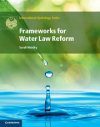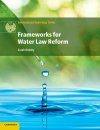![Frameworks for Water Law Reform Frameworks for Water Law Reform]()
Click to have a closer look
About this book
Contents
Customer reviews
Biography
Related titles
About this book
This timely book designs and develops an original, analytical framework for water law reform processes, using case studies across four jurisdictions. Addressing the four principal areas of water law: integrated water resource management (IWRM) and river basin planning, water rights and allocation, water pollution and quality, and water services, Frameworks for Water Law Reform provides a comprehensive study of water law, within the context of global and regional policy agendas. Case studies from England, Scotland, South Africa and Queensland, Australia are presented, providing comparators from both common law and mixed jurisdictions, from the northern and southern hemisphere, and from developed and developing countries. A legislative framework is proposed for water law reform processes, and the consequences of different reform options are considered and investigated. A valuable resource for academics and graduate students in environmental law, resource management, hydrology and social science, Frameworks for Water Law Reform is also highly relevant to policymakers, NGOs and legal practitioners.
Contents
1. Policy context
2. Integrated Water Resource Management and river basin planning
3. Water rights and allocation
4. Water pollution and water quality
5. Governance and regulation of water services
6. General conclusions
References
Index
Customer Reviews
Biography
Sarah Hendry is a Lecturer in Law at the University of Dundee in the Centre for Water Law, Policy and Science, a Category 2 Centre under the auspices of UNESCO, where she specialises in comparative national water law, with special expertise in EU and Scots water and environmental law. She is Director of the Centre's taught programmes and Advisor of Studies for its research students, as well as guest lecturer in water and environmental law at UNESCO IHE in Delft, The Netherlands. Her interests extend across both water resources and water services, and she sits on the Scottish Customer Forum, a new body to better represent consumers in price setting for water services.








































